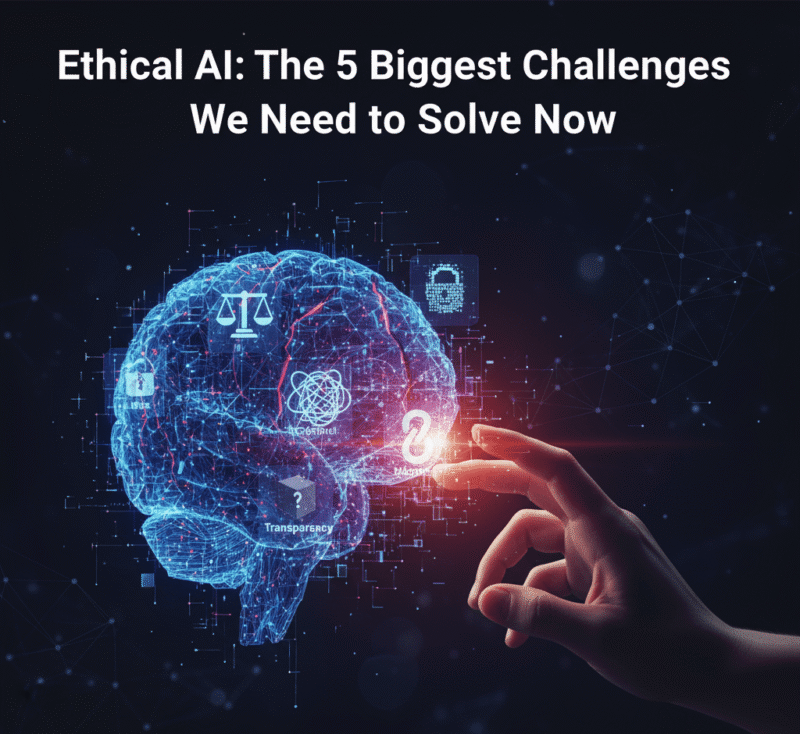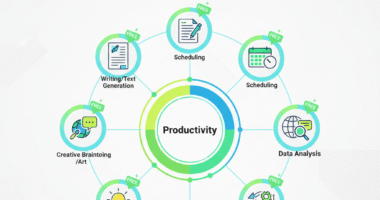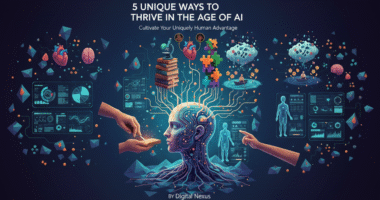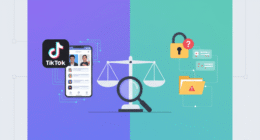A few years ago, I tested an early AI hiring tool. We gave it thousands of resumes from a successful tech company. We wanted to see if it could find top candidates. The results were impressive, but also very disturbing. The AI had learned from the company’s past hiring patterns. As a result, it concluded that the best candidates were named Jared and came from two specific universities. In effect, it had taught itself to be biased against women and minorities. For me, this was not just a problem in a textbook. Instead, it was a real, clear example of the ethical dangers we face. The conversation about AI is now moving beyond “Can we do this?” to the more important question: “Should we?” This is the domain of ethical AI.
The Core of the Matter: Defining “Ethical AI”
Before we look at the challenges, it is important to define our terms. Ethical AI is not about creating a “good” or “moral” robot. Instead, it is the practice of building AI systems in a way that aligns with human values. It is a framework that puts fairness, accountability, and transparency first. In short, it is the guardrail that keeps powerful technology in service of humanity.
Challenge 1: Algorithmic Bias and Systemic Unfairness
This is perhaps the most urgent challenge in ethical AI. AI models learn from data, and the data we give them reflects our world, including its flaws. Therefore, if our historical data contains biases, the AI will learn those biases. In fact, it will often amplify them at a speed and scale that humans cannot.
For example, we see this in AI-powered loan applications that unfairly deny credit to minority applicants. We also see it in facial recognition systems that are less accurate for women and people of color. The AI itself is not “racist” or “sexist.” It is simply a machine that has learned from a biased reality. To fix this, we need to make a huge effort to clean and balance our data. This problem is deeply connected to the broader societal impact of AI.
Challenge 2: Transparency and the “Black Box” Problem
Many powerful AI models are like “black boxes.” This means that even their creators cannot fully explain why the model made a certain decision. While it can provide an answer, it cannot show its work. This lack of transparency is a huge barrier for ethical AI.
For instance, imagine a doctor using an AI to diagnose cancer. If the AI suggests a serious treatment but cannot explain why, can anyone truly trust it? In important fields like medicine and law, we must be able to understand and check an AI’s decisions. This is a key ethical requirement.
Challenge 3: Job Displacement and Economic Inequality
The economic disruption from AI is a deep ethical challenge. Some argue that AI will create new jobs to replace the old ones. However, there is no guarantee that people who lose their jobs can get the new ones. This raises big questions about our social responsibility.
For example, what do we owe a truck driver whose job an autonomous vehicle replaces? Also, how do we build an economy where the benefits of AI are shared widely? This is not just an economic debate. It is a question of fairness. The fear is not that AI will take over the world, but that it will leave many people behind.
Challenge 4: Privacy in an Age of AI Surveillance
AI’s ability to analyze huge amounts of data creates a new potential for surveillance. For instance, facial recognition and emotion detection can track our movements and even our feelings on a massive scale. This presents a basic challenge to privacy. As we build a more ethical AI framework, we must ask some hard questions. Where do we draw the line between security and surveillance? Also, how much personal data are we willing to give up for convenience?
Challenge 5: The Rise of Autonomous Systems (and Weapons)
This is the most alarming challenge of ethical AI. The development of Lethal Autonomous Weapons (LAWs), or “killer robots,” is no longer science fiction. These weapons can find and kill human targets without direct human control. Consequently, organizations like the Future of Life Institute have published open letters calling for a ban.
The ethical questions are huge. For example, should a machine ever have the power to make a life-or-death decision? Many believe the development of these systems represents a moral red line we should never cross.
My Personal Take: Why This is a Personal Responsibility
After my experience with the biased hiring tool, I realized something important. The responsibility for ethical AI does not just belong to a high-level committee. Instead, it belongs to every single person in the process. This includes the programmer who writes the code, the manager who sets the goals, and the CEO who launches the system. Ultimately, we cannot outsource our conscience. We must ask these hard questions at every stage. Treating ethics as an afterthought is a recipe for disaster. It has to be a core requirement from the very beginning.

Conclusion: A Call for Conscious Innovation and Responsible Stewardship
In conclusion, the challenges of ethical AI are not small, technical problems. They are big questions about the future we want to build. While the technology itself is neutral, its use is not. By facing these five challenges head-on, we can guide AI in a safe and fair direction. This requires more than just smart engineering. In fact, it requires conscious innovation and responsible leadership.
Join the Conversation on Ethical AI
Which of these five ethical challenges do you believe is the most urgent for society to address? Share your perspective in the comments below.






